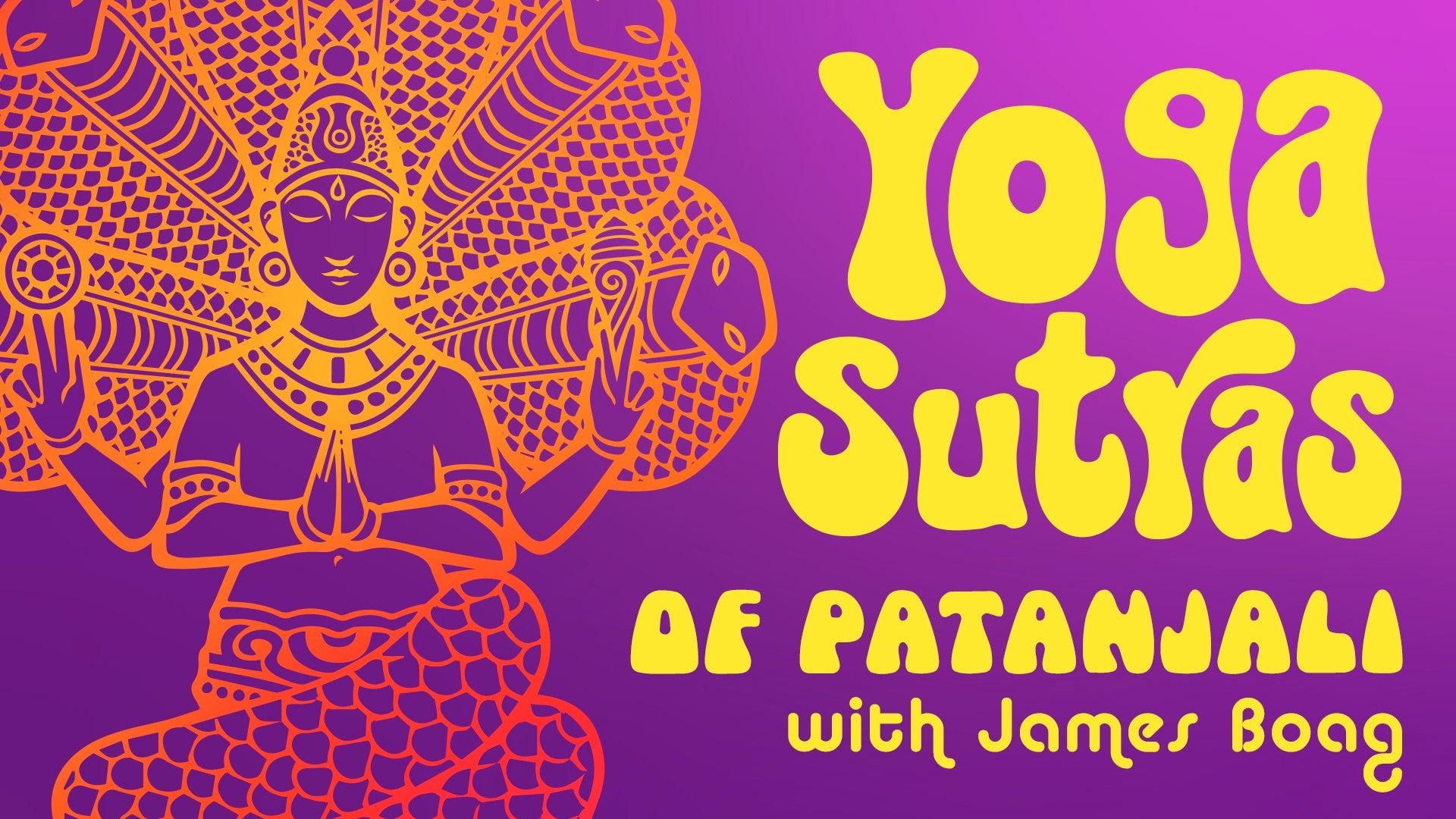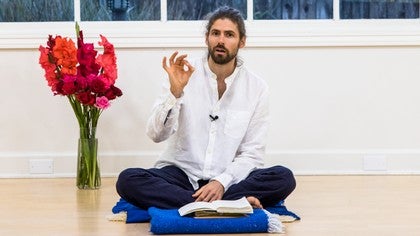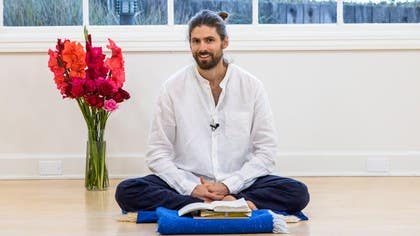Description
About This Video
Transcript
Read Full Transcript
So in the 23rd Sutra, Patanjali says there is an alternative method, and this is basically to devote to God, to offer one's actions to that which one considers the highest. And as we have seen, this is a very broad and inclusive teaching because Patanjali makes it an option. And let's now look at how he defines Ishwada. So he's mentioned Ishwada, the Lord, the Supreme, this idea of God, so having introduced this new idea, what does he mean by it? Now he mentioned, as we explored a little bit, the 23rd Sutra, the way that God, or other similar words, can have a certain charge for some people, and how they mean different things to different people.
Basically, God is one of those words that will mean something, I would guess, unique to every listener. So if you're going to try to define God, that's quite a challenge. But we're dealing here with Patanjali, the most eminent of sages, this master of language. And so in these ensuing sutras, Patanjali does something altogether again quite remarkable with language. At least the way I see it, Patanjali gives a definition or a description of the Supreme that is not controversial.
It's hard to take objection to it. It's very inclusive and very broad. And the basic idea is that Ishwada, the Supreme, is a purusha, a conscious entity, like us, that is vishesha, is distinct and different from us, because while we are consciousness that is in many ways limited, and we experience limitations, Ishwada is not subject to any of those limitations. So let's have a look how Patanjali begins now in the 24th Sutra to define what he means by Ishwada. So he said in the 23rd, you can offer everything to Ishwada.
So what is Ishwada? So he begins in the 24th, klesha karamavipaka shaya iraparam nishtaf purusha vishesha ishwaraha. So Ishwaraha is a purusha vishesha, a distinct type of conscious entity. Human beings, we are also purushas, we are conscious beings, we have consciousness, but the consciousness that we experience, we experience it in a body. Now they say in India, a soul without a body is lost, so it's a great thing to have a body.
A body without a soul is a corpse. But the living body brings with it, it's like any powerful instrument or powerful tool, it could be described as a dual edged sword. It has powerful capacities, but they can sometimes do things contrary to what one might want if one doesn't harness the tool particularly skillfully. And so our body, our body-born consciousness, because the body itself is constituted of the ever-changing stuff of prakriti, of nature, it's very easy to become identified with limitations, as we've already mentioned. But Patansha describes Ishwada as that purusha which is a vishesha which is distinctive and special if you like, because it is not limited by any of the afflictions that flesh is heir to, by any of the afflictions that are a really natural part of being an incarnate human being.
So he says, klesha karma vipaka shaya ira paramrishta purusha vishesha ishwaraha. Klesha is a distinct purusha that is untouched by the kleshas. Now klesha means afflictions. Patansha will define these and look at them in a little bit more detail in the opening section of the second chapter, though I will look at it briefly now just to give us a kind of heads up and a bit more orientation with this sutra. But he also says that Ishwada is not touched by karma or its effects.
Now karma means action, it's the idea in yoga is that as human beings we often experience what is referred to as the binding influence of action. We do something and if we get a good result it tends to color or influence or tint the way that we look upon that type of thing again. If we do something we have an unpleasant experience or a bad result. That too colors our experience, it creates a veil or a filter and so as we do things it leaves an impression which creates a desire for more of that or less of that. So this cycle of desire, action, impression and this cycle gets quite a lot of consideration in the Bhagavad Gita and you can hear more about it in the Yoga Anytime show, the Song of Self.
This gets explored in more detail but the basic idea is when we do something it leaves an impression and those impressions can accumulate until we become conditioned by them. So human beings we see things through the cumulative lens of our conditionings depending on what we do and the effects or impacts or results that we experience. But Ishwada is completely free of that, not touched by that at all, not touched by the natural afflictions of having a body, having a bodily vehicle. So what are these afflictions? They are Aridya, Asmita, Raga, Dvesha and Apini-Vesha and when we get to Chapter 2 of the Yoga Sutra we'll look at these in more detail but briefly, Aridya basically means partial knowledge, seeing things not completely, only seeing things to a limited degree and the idea is that when we are an incarnate human being how do we see?
Through two eyes, so we do see duality, we do see light and shade. This is just a natural part of the experience and think about it, when we're a human being there's always more that we can't see than that that we can. So as a human being, because we see through these two eyes, we're subject to only being able to see part of the question most of the time, unless we're in that really deep yogic state but Ishwada, this isn't the case. Asmita, we also experience as human beings a limited sense of identity, I'm this, I'm not that. Raga and Dvesha, Raga basically means we experience something good, we want more.
Dvesha, we experience something unpleasant, we want to avoid it. So it's this residual impression of our actions and Abhinaveshas, as human beings we're living in this body, we don't want to lose it. We fear death, we cling to life and we fear change. And all of these things they naturally kind of get in the way of us being spontaneously holy in the present moment. But the idea is that these afflictions, they don't touch Ishwada at all.
So the idea basically is, human beings, we are purushas, we are conscious but we have limitations, many limitations. But Ishwada, as this sutra makes clear, is not limited by will, by action or capacity, not affected by karma, not affected by having a body. The 25th sutra potentially then takes it further and he says, also, as human beings, we have limitation of knowledge. For example, I might know how to speak the English language but not the Bulgarian language. For example, I might know how to make one particular recipe but not know how to prepare this thing in the kitchen.
For example, I know some things, I don't know other things. So in the 25th sutra, Patanjali says that Ishwada does not experience this limitation of knowledge but not only does Ishwada not have any limitation of knowledge, Ishwada is the bhija, the seed, the source, the essence of omniscience. In other words, Ishwada is completely unlimited by knowledge. So in the 24th, Ishwada is unlimited by will, action, capacity, and in the 25th, Ishwada is unlimited by knowledge. All knowledge exists within Ishwada, the idea that Ishwada is consciousness, the underlying enabling factor for any understanding, for any knowledge.
So also, unlimited by knowing, the capacity to know by knowledge. In the 26th sutra, sa'esha purbesha mapi guru kali na nava che raat, and as human beings, though we are conscious to some degree, we also experience limitation of time and space but this is not the case for Ishwada. Ishwada is not limited by time because that Ishwada was also the guru purbesha mapi, even of those who have preceded us, even of those who have gone before. So in other words, Ishwada was the guru of all of those practitioners, teachers, masters who have come before. Now he's mentioned the word guru here.
So I think it's important to just kind of clarify what I understand by that. So guru is one of those Sanskrit words that has infiltrated many other languages and sometimes gets used rather loosely as being somebody who's an expert, somebody who has got highly developed knowledge in a particular field. But an expert, I kind of like that definition of an expert, is somebody who knows rather a lot about rather a little, you know, if you're an expert, you're a specialist. And a guru is the idea that if you're going to be a guru in the yogic sense, you've got to kind of know the spectrum of who you are. So you're not a specialist or an expert, you've got that vast inclusive knowledge.
But the guru, this word is very interesting because literally guru means heavy, as opposed to lagu, which means light. So a guru is any person, place, thing, experience, the influence of which is heavy duty enough to shake you out of your current sense of yourself or your current level of understanding into new understandings, into new insights. But what is it that allows us as human beings to learn? I've been a teacher in various forms or guises for more than 20 years. And many years ago, I came to something of a conclusion about teaching, which is you can't teach anybody anything.
And if you are sitting in the seat, standing in the shoes of the teacher, the best you can hope for, if you want to execute that role skillfully, is to just do what you can to honestly set up a situation which makes it a little bit more conducive for learning to occur. You can facilitate somebody learning, but you can't teach them anything. We learn by ourselves. It's by doing it ourselves, by grasping at ourselves in whatever way we do that we actually learn something. So what is it that allows us to learn something?
It is only, I would say, our consciousness. It is only our awareness that allows us to notice that something new has been understood. It's only the intrinsic powers of our awareness that help us learn. And so I find this sutra interesting because it certainly gives support to the idea that Ishwara, that supreme consciousness, is also present within our own awareness. What potentially says very explicitly is that Ishwara has been the teacher since the beginning of all those who have gone before.
And Ishwara is that which allows us to learn. And also, because he's been the teacher of all those who have come since the beginning, Ishwara is not limited by time or space. So these three sutras, basically what they've said, Ishwara is consciousness, but unlike us is not limited by time or space, by knowing our understanding, by capacity, will, or action, by having a bodily vehicle. In other words, Ishwara is unlimited consciousness, unlimited awareness.
Yoga Sutras of Patanjali: Yoga and the Supreme
Comments

You need to be a subscriber to post a comment.
Please Log In or Create an Account to start your free trial.








